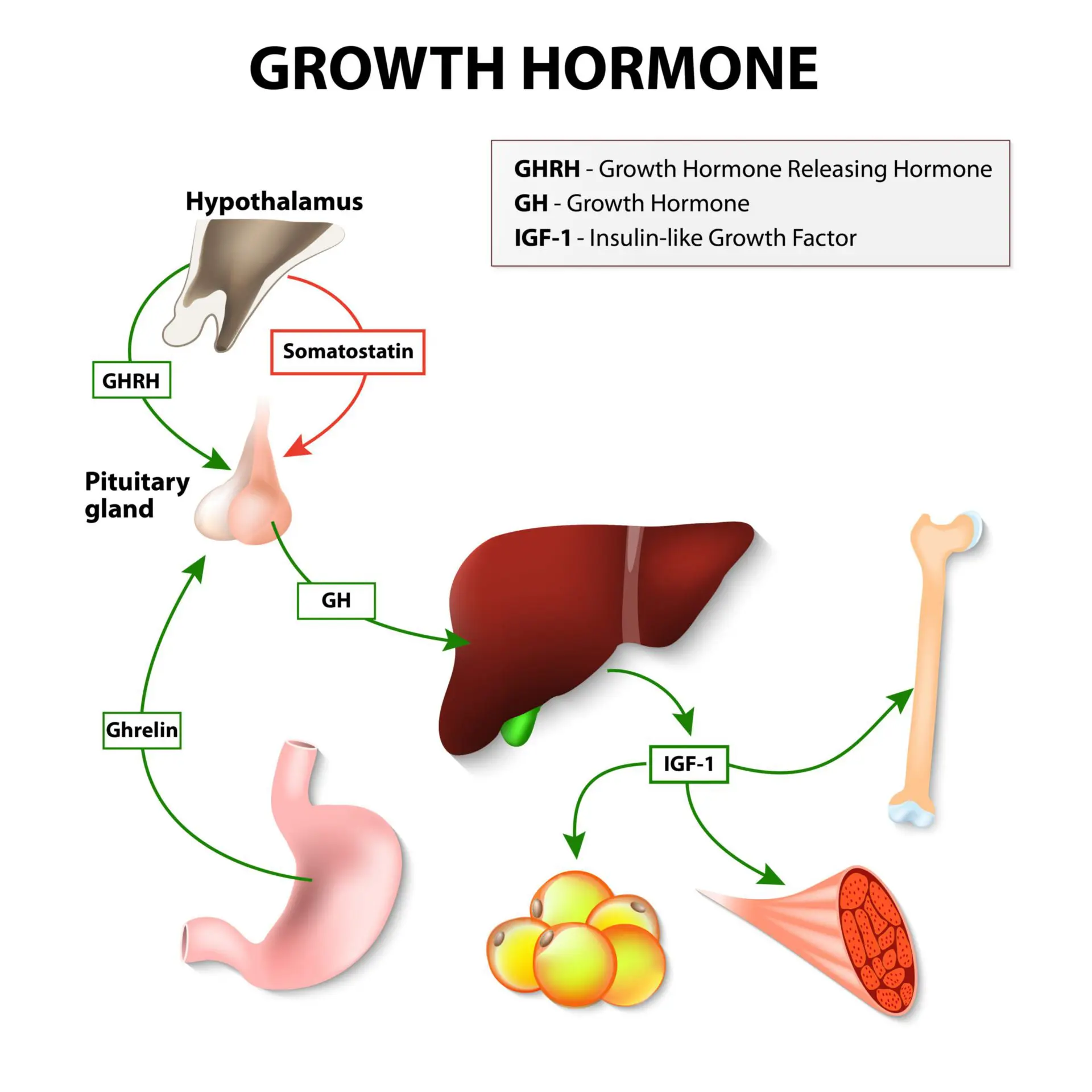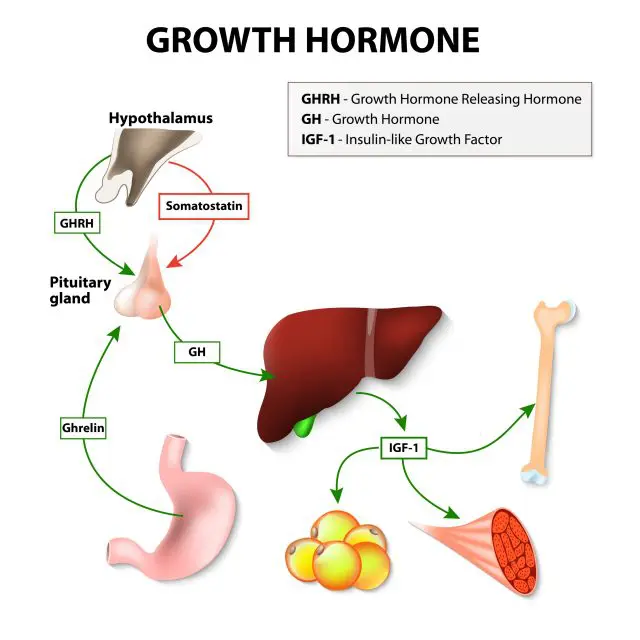Are you tired all the time?
Are you hitting the gyms but gain nothing but sprains and muscle tears?
Is your libido at an all-time low?
If you answered yes to most of the above, your body might not be producing enough human growth hormones (HGH).
What Is Human Growth Hormone (HGH)?
Also known as growth hormones, HGH is a naturally occurring hormone that facilitates growth spurts in children and teenagers.
Released by the pituitary gland, growth hormones are responsible for stimulating bone and muscle tissue growth through the metabolism of proteins, fats, and carbs. Besides that, it also regulates several hormones in your body and other important functions, like:
- Keep your body fat low and build lean muscles
- Strengthen your bones and joints
- Protect your organs from age-related decline
- Promote better hair and nail growth
- Prevent heart-related diseases
- Maintaining healthy libido and sexual functions
- Increase your energy level
When HGH levels are optimized, it helps your body heal faster from strenuous exercises and sports-related injuries. Not only that, but it also improves your exercise capacity, which is why HGH supplements are popular among gym-goers.
How Does HGH Work?
Human growth hormone goes by many names – somatotropin, HGH, and growth hormones. Regardless, like all other hormones, HGH acts as a messenger between your cells and brain.
Produced by the pituitary gland, growth hormone does more than simply helping children and teenagers grow taller. It’s only released into the system for a short time, but it gets to work immediately by stimulating your liver to produce an insulin-like growth factor (IGF-1).
Together, HGH and IGF-1 influence the processes that we mentioned above: protein synthesis, hormone regulation, and metabolism.
Unfortunately, the natural production of HGH declines as you get older. More specifically, this decline begins as soon as you enter your 30s and decreases steadily as you age. By the time you are 50, HGH production would only be about half of when you were 20.
Not only that, but the release of growth hormones is highly dependent on different factors, like exercise, sleep, and food intake. So, if you’ve lived a lifetime of bad lifestyle decisions, your HGH production would probably be lower than others who lived healthily.
The effects of low HGH production also speeds up the process of aging, like getting wrinkles, losing hair, fatigue, and brain fog. Besides that, you might also find yourself packing on weight and losing muscle mass even if you work hard at the gym. With low HGH levels, you’re also more susceptible to heart diseases, bone injuries, and subpar sexual functions.
The most common treatment for low growth hormone production is HGH injections, which are often given to people who have a severe growth hormone deficiency. Besides needing a prescription, these injections are also painful and expensive.
But most importantly, HGH injections might cause more harm than good. When your body receives too many synthetic growth hormones, it can shut down and release lower levels of HGH than before you started trying.
Thankfully, there are plenty of ways to increase your HGH levels naturally and safely.
6 Most Effective Ways To Naturally Boost HGH
-
Exercise
Although all exercises increase HGH production to some degree, your body produces the most HGH when your heart rate bursts above your anaerobic threshold.
In other words: high-intensity interval training (HIIT). When done right, HIIT can increase your HGH levels to 450% over baseline.
HIIT is a form of training that consists of short bursts of high-intensity exercises followed by less-intense recovery periods. There are several heart-pumping workouts to choose from – 30-second running sprint, cycling sprint, rowing, or swimming. You can also try weight training to get your HGH production going.
There’s no universal session duration, but workouts lasting between half an hour to an hour are the best to kickstart your HGH production. The intensity of your workouts should be at a level where you can’t carry out a conversation but are not completely tapped out.
That being said, any exercise increases your HGH production over 24 hours post-workout. Not only that, but working out regularly can also make you tired and help you lose weight, both of which stimulate your pituitary gland to release more growth hormones.
-
Lose weight
Your natural growth hormone production is directly related to the amount of body fat you carry.
Typically, men with higher abdominal fat are found to have lower levels of HGH. In a study, participants with three times as much body fat as the control group only had half the HGH production. The good news is, the participants’ HGH production returned to normal after losing the excess weight.
Although both men and women experienced an increase in HGH production after shedding the pounds, men tend to have a more drastic improvement. This could be due to fat distribution since men are more prone to pack on a permanent beer belly than women. The ideal body fat percentage for men is around 15%.
-
Maintain a healthy diet
Eating healthy is not only conducive to your overall well-being, but it also holds the key to increasing your HGH production naturally.
In fact, some foods are directly linked to how well your pituitary gland churns out growth hormones.
The first thing you should do when optimizing your diet is cutting out sugar. Eating too much sugar signals your hypothalamus to release somatostatin, which inhibits HGH production. Besides that, excess sugar consumption can also contribute to obesity, creating a hostile environment for your HGH level.
According to a study, incorporating 15-20g of arginine in your diet can boost night-time HGH production to up to 60%. Red meat, soybeans, and chicken are great sources of this amino acid, so make sure to include these foods in your lunch or protein shake.
Besides that, you can also include melatonin-rich superfoods in your diet. Foods like eggs, fish, and tomatoes are great for HGH production since they promote a good night’s sleep.
Intermittent fasting
Besides eating healthy, you can also control your growth hormone production by fasting.
Research has indicated that you increase your HGH levels by at least 300% after a five-day fast. If you can hold out for a week, you can see an HGH increase as high as 1,250%.
This isn’t an isolated incident either – this result has been replicated in many studies that saw a doubling or even tripling of HGH levels in just 2-3 days into a fast.
Intermittent fasting is the most practical option while bringing a lot of benefits to the table. In the short-term, intermittent fasting improves growth hormone production since it keeps your insulin levels low. Not only that, but it can also help you lose weight, which also creates a great environment for HGH production.
A common way to optimize your growth hormone production is to eat within an 8-hour window after fasting for 16 hours. You can also limit your caloric intake to 500-600 calories for two days per week to achieve similar results.
-
Sleep better
Good-quality sleep plays a huge role in improving your body’s ability to release HGH into your bloodstream.
Before we get into how better sleep quality affects your HGH production, there are a few crucial things to learn about sleep itself.
Your body goes through four stages of sleep: awake, light, slow-wave sleep, and REM sleep. Typically, you can go through about 4 to 5 90-minute cycles of sleep with varying lengths for your sleep stages. You tend to have deeper slow-wave sleep early in your cycles and longer REM stages in the morning.
If you’re not sleeping enough hours, your body would most likely not go through all the stages of sleep required for optimal HGH production.
Besides that, it’s also important to note that growth hormone isn’t released continuously into your system. Instead, it is released in intervals throughout your night with the largest pulses occurring just before midnight and decreases as the sun rises.
Because of this, you should not only take care of the hours you sleep but also when you sleep. Ideally, you should build up a consistent sleep schedule and minimize potential interruptions after you get into bed.
-
Supplements
When all else fails (and sometimes it just does), you can rely on supplements to give yourself a fighting chance at increasing your HGH production.
There are a ton of HGH supplements aimed to help your body produce enough growth hormones to stop or even reverse the effects of aging.
That being said, not all supplements are created alike. Some HGH releasers are simply placebos made by opportunistic manufacturers to earn a quick buck. Because of this, you have to be very careful when choosing a product.
GenF20® Plus is one of the best-rated HGH releasers as it uses a unique 100% organic formulation packed with vitamins, amino acids, and herbs. Because of this, it has no side effects and is one of the safest products for long-term consumption. But if it’s not your cup of tea, we’ve compiled a list of the best HGH supplements on the market to help you make the best decision.

